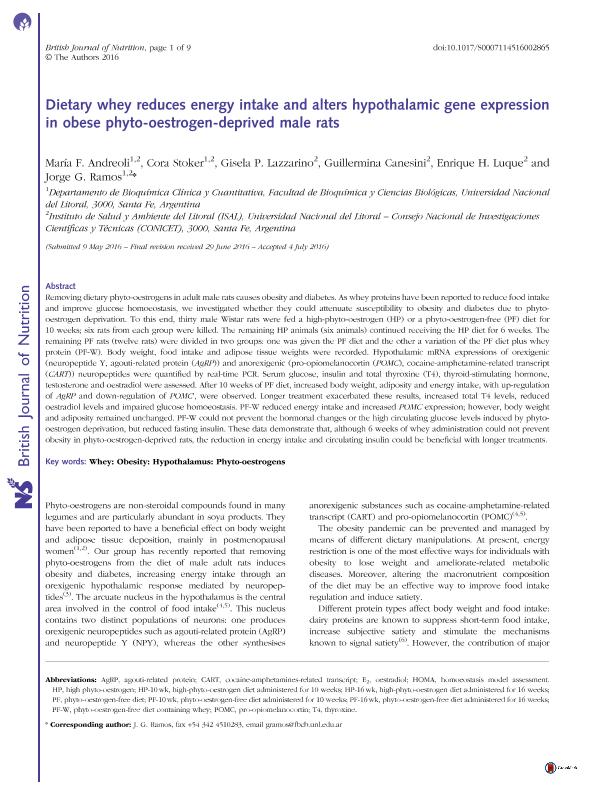Artículo
Dietary whey reduces energy intake and alters hypothalamic gene expression in obese phyto-oestrogen-deprived male rats
Andreoli, Maria Florencia ; Stoker, Cora
; Stoker, Cora ; Lazzarino, Gisela Paola
; Lazzarino, Gisela Paola ; Canesini, Guillermina
; Canesini, Guillermina ; Luque, Enrique Hugo
; Luque, Enrique Hugo ; Ramos, Jorge Guillermo
; Ramos, Jorge Guillermo
 ; Stoker, Cora
; Stoker, Cora ; Lazzarino, Gisela Paola
; Lazzarino, Gisela Paola ; Canesini, Guillermina
; Canesini, Guillermina ; Luque, Enrique Hugo
; Luque, Enrique Hugo ; Ramos, Jorge Guillermo
; Ramos, Jorge Guillermo
Fecha de publicación:
07/2016
Editorial:
Cambridge University Press
Revista:
British Journal of Nutrition
ISSN:
0007-1145
Idioma:
Inglés
Tipo de recurso:
Artículo publicado
Clasificación temática:
Resumen
Removing dietary phyto-oestrogens in adult male rats causes obesity and diabetes. As whey proteins have been reported to reduce food intakeand improve glucose homoeostasis, we investigated whether they could attenuate susceptibility to obesity and diabetes due to phytooestrogendeprivation. To this end, thirty male Wistar rats were fed a high-phyto-oestrogen (HP) or a phyto-oestrogen-free (PF) diet for10 weeks; six rats from each group were killed. The remaining HP animals (six animals) continued receiving the HP diet for 6 weeks. Theremaining PF rats (twelve rats) were divided in two groups: one was given the PF diet and the other a variation of the PF diet plus wheyprotein (PF-W). Body weight, food intake and adipose tissue weights were recorded. Hypothalamic mRNA expressions of orexigenic(neuropeptide Y, agouti-related protein (AgRP)) and anorexigenic (pro-opiomelanocortin (POMC), cocaine-amphetamine-related transcript(CART)) neuropeptides were quantified by real-time PCR. Serum glucose, insulin and total thyroxine (T4), thyroid-stimulating hormone,testosterone and oestradiol were assessed. After 10 weeks of PF diet, increased body weight, adiposity and energy intake, with up-regulationof AgRP and down-regulation of POMC´, were observed. Longer treatment exacerbated these results, increased total T4 levels, reducedoestradiol levels and impaired glucose homoeostasis. PF-W reduced energy intake and increased POMC expression; however, body weightand adiposity remained unchanged. PF-W could not prevent the hormonal changes or the high circulating glucose levels induced by phytooestrogendeprivation, but reduced fasting insulin. These data demonstrate that, although 6 weeks of whey administration could not preventobesity in phyto-oestrogen-deprived rats, the reduction in energy intake and circulating insulin could be beneficial with longer treatments.
Palabras clave:
HYPOTHALAMUS
,
OBESITY
,
PHYTO-OESTROGENS
,
WHEY
Archivos asociados
Licencia
Identificadores
Colecciones
Articulos(ISAL)
Articulos de INSTITUTO DE SALUD Y AMBIENTE DEL LITORAL
Articulos de INSTITUTO DE SALUD Y AMBIENTE DEL LITORAL
Citación
Andreoli, Maria Florencia; Stoker, Cora; Lazzarino, Gisela Paola; Canesini, Guillermina; Luque, Enrique Hugo; et al.; Dietary whey reduces energy intake and alters hypothalamic gene expression in obese phyto-oestrogen-deprived male rats; Cambridge University Press; British Journal of Nutrition; 116; 6; 7-2016; 1125-1133
Compartir
Altmétricas



